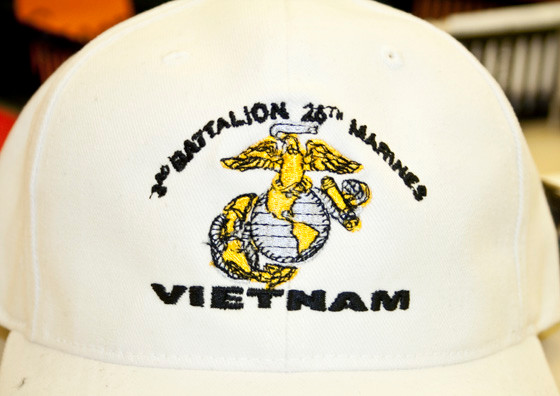Wantagh veteran recalls time in Vietnam
Maybe it was the “lucky” watch that kept Wantagh resident Michael Padula alive in Vietnam. Padula — a member of the 3rd Battalion, 26th Marines, served in Vietnam from 1966-69. The watch had been passed down from one family member to another. It kept Padula’s father safe in New Guinea, the Philippines and Japan during World War II and protected his uncle in South Korea during the Korean Conflict and it might have brought Padula some luck during the terrible siege at Con Thien in September of 1967.
“I don’t know if it was luck or just one of those things,” said Padula. “I can’t explain it.”
Padula joined the service right after high school. “I was a kid looking for my place in the sun,” he said. Padula, who now lives in Wantagh, graduated from Elmont Memorial High School in 1966. “It was the beginning of the heavy draft. You either went to college or into the Army. I figured if I was going [to Vietnam], I’d go with the best.”
After eight weeks of boot camp and basic training, Padula received a 30-day leave before being sent to Vietnam. “I spent my Thanksgiving right here in Wantagh at my aunt and uncle’s house,” Padula recalled. “My parents didn’t want me to go, but I was young and looking for a thrill, for excitement.”
What Padula found was reality. That first dose of reality came onboard The Walker, a military ship that took Marines and Army soldiers from California to Danang, Vietnam. “It was 12 days of boredom and plenty of inoculations,” Padula explained.
While onboard, Padula had plenty of time to read the graffiti written by scores of soldiers who took the same journey. It was scrawled on the canvases Padula and the other soldiers slept on. “The graffiti was what you’d expect from kids,” he said. “Most of us were 18, 19 or 20. But I recall what one guy wrote — ‘War is a good business; my mother has invested her son.’”
Padula, trained as a rifleman, was assigned to India Company. “They don’t waste anytime. I was in PhuBai and then to Khe Sanh [before the 1968 battle] and then in September Con Thien.”
Padula doesn’t talk about those four days when his battalion was repeatedly attacked by forces of North Vietnamese infantry. “It was Custer’s Land Stand with air support,” he said. That very quote is used in a book called “Ambush Valley” by Eric Hammel that recounts the battle at Con Thien from Sept. 7-10, 1967. Padula was one of the men interviewed for that book.
“When the 3rd Battalion of the 26th Marines moved into position near the DMZ in September ’67 they didn’t know that an entire North Vietnamese regiment lay close by,” reads the review of Ambush Valley by the Library Journal. “In two battles the Marine battalion lost 40% of its combat strength and barely escaped annihilation. For the Americans, the September 7 and 10 contacts exemplified Murphy’s Law in action: 3/26 was bombarded by its own artillery, became the target of its own planes, received a minimum of resupply while running low on ammunition, and was subjected to relentless assaults by the 812th NVA Regiment.”
“In general,” Padula said, “I believe they used the infantry as bait to lure them (North Vietnamese Army) into our artillery and jets. They brought in one battalion after another.” More than 1,400 Marines were killed and nearly 9,300 wounded in the fighting in and around Con Thien, according to Marine records. Padula said he was “terrified at first, but then your training kicks in and you don’t think about it.”
Padula, who turned 19 that Sept. 8, was injured on Sept. 10, the final day of the siege. He waited all night for help. On Sept. 11, the helicopters finally came and him out.
He was taken to CamRanh Bay Hospital, then returned briefly to India Company but was lucky enough to be sent back to Camp LaJune in North Carolina. Meanwhile, India Company went on to fight in the 1968 battle at Khe Sanh. Padula volunteered for duty in Keflavik, Iceland, as one of the Marines who guarded a Naval air station in Keflavik. He was 21 years old in 1969 when he re-entered civilian life.
And now back to his lucky watch. Padula is happy he had it with him, but he mostly thanks his buddies for keeping him alive. “They are the greatest bunch of guys. I knew I could depend on them,” he said, “I served with real heroes like Russ Anderson and James Barrett who both received the Navy Cross, and Lt. Bob Stimson, a silver star.”
Thirty-seven years later, Padula said he has no regrets about his time in the Marines, and does not feel the country owes anything to Vietnam veterans. “Yes, we had shabby treatment when we got home,” he said, “but I’m glad the young ones [returning from Iraq and Afghanistan] are being treated with respect. They deserve it.”

 44.0°,
Mostly Cloudy
44.0°,
Mostly Cloudy 




